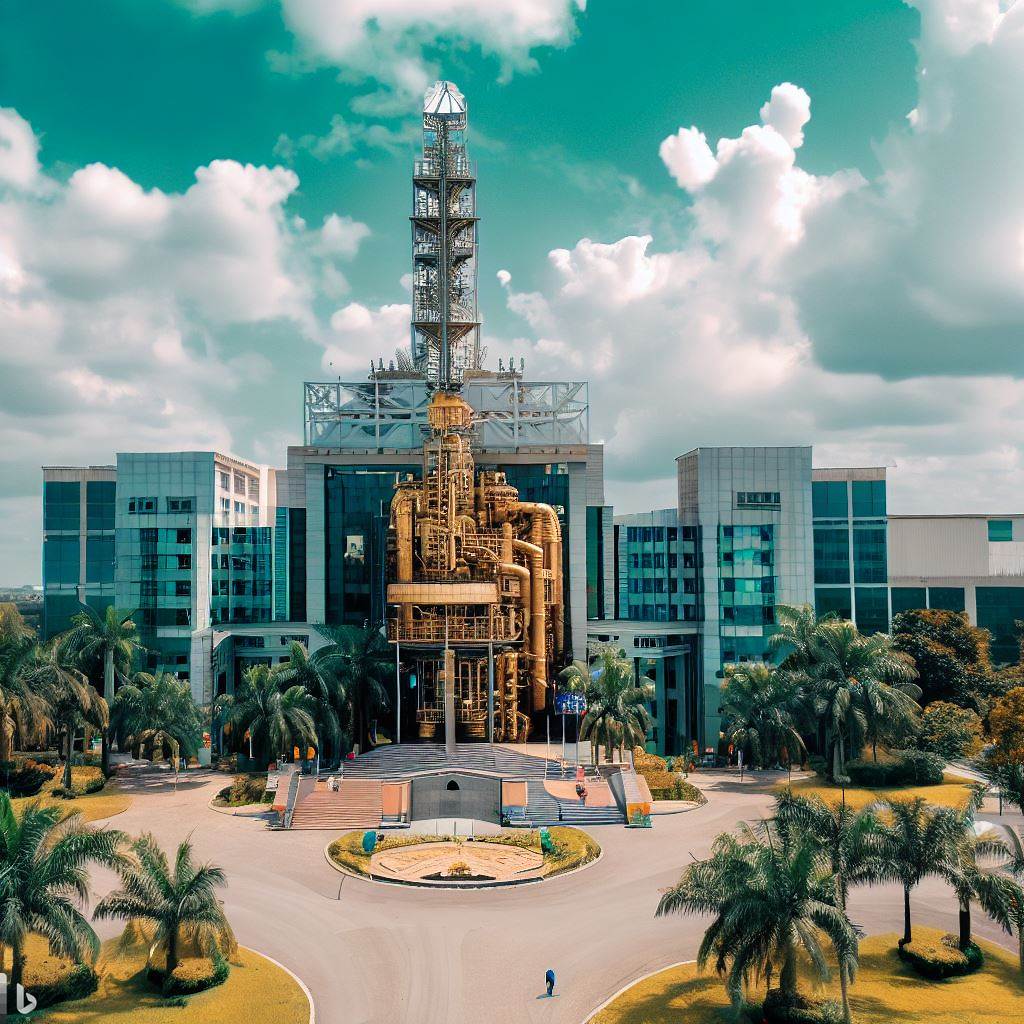Introduction
This blog post delves into the vital role of petroleum engineers in Nigeria’s energy sector.
It offers a concise overview of the country’s petroleum industry, emphasizing its growth potential.
These engineers play a pivotal role in various aspects, including exploration, extraction, and production of oil and gas.
Furthermore, the blog post focuses on shedding light on the educational prerequisites for those aspiring to become petroleum engineers in Nigeria.
By understanding the significance of these professionals and the path to joining their ranks, readers gain valuable insights into the dynamic world of petroleum engineering within the nation.
Role and Responsibilities of Petroleum Engineers
Description of the work carried out by petroleum engineers
- Design and develop methods for extracting oil and gas from underground reserves.
- Analyze geological data to determine the location and size of potential oil deposits.
- Develop drilling plans and supervise drilling operations to extract oil or gas.
- Conduct testing and analysis on oil samples to assess its quality and determine extraction techniques.
- Collaborate with geologists and other professionals to identify reservoir characteristics and plan extraction strategies.
- Ensure cost-effective operations by optimizing production techniques and minimizing environmental impact.
Significance of their role in the oil and gas sector in Nigeria
- Contribute to the exploration and production of Nigeria’s vast oil and gas reserves, a major source of revenue.
- Help maintain and improve the country’s energy security by efficiently extracting and managing resources.
- Play a crucial role in ensuring the safe and sustainable extraction of oil and gas reserves.
- Provide technical expertise and innovative solutions to overcome challenges in the industry.
- Contribute to the economic growth and development of Nigeria by attracting foreign investments.
- Create employment opportunities and enhance the skills and knowledge of the local workforce.
Petroleum engineers in Nigeria have a crucial role in the oil and gas sector, contributing to the exploration and production of the country’s valuable resources.
Their work involves designing and developing extraction methods, analyzing geological data, and optimizing production techniques.
Through their efforts, they contribute to Nigeria’s energy security and economic growth while ensuring environmental sustainability.
The significance of their role cannot be understated, as they help drive the nation’s economy and attract foreign investment.
Read: Universities Offering Robotics Engineering in Nigeria
Educational Requirements for Petroleum Engineers in Nigeria
In Nigeria, becoming a petroleum engineer requires fulfilling specific educational requirements.
These requirements vary in terms of the general educational background, bachelor’s degree, and the potential for advanced degrees.
General educational background needed
Prior to pursuing higher education in petroleum engineering, individuals must have a high school diploma or its equivalent.
Additionally, mathematics and science courses taken during secondary school play a crucial role in building a strong foundation.
Bachelor’s degree in petroleum engineering
The first step towards a career in the petroleum industry is completing a bachelor’s degree program in petroleum engineering.
This undergraduate program provides students with essential knowledge and skills required for the field.
During the program, students are exposed to core courses that delve into various aspects of petroleum engineering.
By studying these courses, individuals gain a comprehensive understanding of geology, fluid mechanics, thermodynamics, and other related subjects.
This knowledge forms the basis for a successful career in the industry.
Master’s degree or higher
For individuals who aspire to advance their careers further, pursuing a master’s degree or higher education is highly beneficial.
An advanced degree opens up a wide range of opportunities in research, academia, and management positions within the petroleum sector.
By obtaining a master’s degree, individuals can specialize in a specific area of petroleum engineering.
Specialization allows for in-depth knowledge and expertise development, making professionals more competitive in the job market.
In addition to specialization, conducting research during advanced studies contributes significantly to professional growth.
Research projects enable individuals to gain hands-on experience and contribute to the advancement of the field.
In short, the educational requirements for petroleum engineers in Nigeria consist of a high school diploma or its equivalent, mathematics and science courses at the secondary level, a bachelor’s degree in petroleum engineering, and the option to pursue advanced degrees.
These educational milestones ensure that aspiring petroleum engineers have the necessary knowledge and skills to excel in the industry and contribute to the development of the petroleum sector in Nigeria.
Read: Role of Petroleum Engineers in Nigeria’s Energy Sector

Accreditation and Certification
To excel as a petroleum engineer in Nigeria, it is crucial to attend an accredited university offering petroleum engineering programs.
This provides the fundamental knowledge and skills required for a successful career in the industry.
Accredited universities offering petroleum engineering programs in Nigeria
- University of Lagos: Renowned for its comprehensive petroleum engineering program, providing a strong foundation in the field.
- Federal University of Petroleum Resources, Effurun: Focuses on specialized petroleum engineering courses, equipping students with practical skills in the oil and gas sector.
- University of Port Harcourt: Offers a well-structured petroleum engineering program with modern facilities and experienced faculty members.
- University of Benin: Emphasizes research and innovation in its petroleum engineering program, preparing students for industry challenges.
- University of Uyo: Known for state-of-the-art laboratories and industry partnerships, offering a holistic petroleum engineering curriculum.
- University of Ilorin: Provides students with a solid understanding of petroleum engineering principles, ensuring competence in the field.
- Ahmadu Bello University: Focuses on practical training and industry exposure, preparing students for lucrative careers in petroleum engineering.
- Federal University of Technology, Owerri: Offers a multidisciplinary petroleum engineering program, integrating engineering principles with real-world applications.
Certification and licensing requirements for practicing as a petroleum engineer
- Nigerian Society of Engineers (NSE): Membership in NSE is essential for petroleum engineers, as it serves as a professional body regulating the engineering practice in Nigeria.
- Council for the Regulation of Engineering in Nigeria (COREN): COREN is responsible for certifying the competence and professionalism of engineers, including petroleum engineers, in the country.
The Nigerian Society of Engineers (NSE) plays a vital role in ensuring the professional growth and development of petroleum engineers.
NSE membership provides access to networking opportunities, technical resources, and continuous learning programs.
Additionally, the Council for the Regulation of Engineering in Nigeria (COREN) holds the responsibility of regulating and licensing engineers.
This ensures that petroleum engineers meet the required standards of competence and ethics in their practice.
In summary, attending an accredited university offering petroleum engineering programs in Nigeria is essential for aspiring petroleum engineers.
Furthermore, obtaining certification from professional bodies like the Nigerian Society of Engineers (NSE) and licensing from the Council for the Regulation of Engineering in Nigeria (COREN) greatly enhances the credibility and career prospects of petroleum engineers in the country.
Read: Petroleum Engineering Salary Scales in Nigeria: An Insight
Discover More: The Impact of Computer Engineering on Nigeria’s Economy
Training and Internship Opportunities
Importance of gaining practical experience
Practical experience is crucial for petroleum engineers as it helps them apply theoretical knowledge to real-world situations.
Hands-on experience allows engineers to develop problem-solving skills, understand industry practices, and adapt to challenging environments.
By gaining practical experience, petroleum engineers can enhance their technical skills and become more competent professionals.
Internship programs offered by oil and gas companies in Nigeria
Many oil and gas companies in Nigeria offer internship programs specifically designed for petroleum engineering students.
These programs provide opportunities to work alongside experienced professionals, gaining valuable industry insights and hands-on experience.
Interns can contribute to ongoing projects, collaborate with teams, and learn about various aspects of the petroleum industry.
Training programs available for petroleum engineers
Several training programs are available in Nigeria to enhance the skills and knowledge of petroleum engineers.
These programs cover a wide range of topics, including drilling operations, reservoir management, production techniques, and safety protocols.
Training programs often include practical exercises, simulations, and case studies to provide a comprehensive learning experience.
By participating in these training programs, petroleum engineers can stay updated with industry advancements and improve their expertise.
Engineers can also attend workshops, seminars, and conferences to network with professionals and learn about new technologies.
Lists
Importance of gaining practical experience:
- Apply theoretical knowledge to real-world situations.
- Develop problem-solving skills and understand industry practices.
- Adapt to challenging environments.
- Enhance technical skills and become more competent professionals.
Internship programs offered by oil and gas companies in Nigeria
- Designed for petroleum engineering students.
- Work alongside experienced professionals.
- Gain valuable industry insights and hands-on experience.
- Contribute to ongoing projects and collaborate with teams.
- Learn about various aspects of the petroleum industry.
Training programs available for petroleum engineers
- Enhance skills and knowledge in specific areas.
- Topics include drilling operations, reservoir management, and safety protocols.
- Practical exercises, simulations, and case studies for comprehensive learning.
- Stay updated with industry advancements and improve expertise.
- Attend workshops, seminars, and conferences for networking and learning about new technologies.
Read: A Day in the Life of a Nigerian Petroleum Engineer
Gain More Insights: Nigeria’s Top Institutions for Electrical Engineering Studies
Continuing Education and Professional Development
Continuing education requirements for petroleum engineers
Petroleum engineers in Nigeria are required to engage in continuing education to keep up with industry advancements.
Continuing education helps petroleum engineers enhance their skills, knowledge, and expertise in the field.
Engineers can participate in seminars, workshops, and conferences to meet their continuing education requirements.
These educational activities provide opportunities for engineers to learn about new technologies and industry trends.
By staying updated through continuing education, petroleum engineers can contribute to the growth and improvement of the industry in Nigeria.
Professional organizations and associations in Nigeria
Nigeria has several professional organizations and associations dedicated to petroleum engineering.
These organizations provide valuable resources, networking opportunities, and professional development support for engineers.
One prominent organization is the Society of Petroleum Engineers (SPE).
The SPE offers various educational programs, technical publications, and conferences for petroleum engineers.
Engineers can become members of the SPE to access these resources and stay connected with their peers.
Another important association is the Nigerian Association of Petroleum Explorationists (NAPE).
The NAPE focuses on promoting the exploration and production of petroleum resources in Nigeria.
Members of NAPE benefit from access to cutting-edge research, expert insights, and networking events.
Continuing education and involvement in professional organizations play a crucial role in the career development of petroleum engineers in Nigeria.
By actively seeking opportunities to expand their knowledge and network, engineers can stay at the forefront of industry advancements and contribute to the sustainable growth of the sector.
Read: Prospects of the Petroleum Engineering Field in Nigeria
Conclusion
Recap of educational requirements for petroleum engineers in Nigeria
Throughout this chapter, we have discussed the educational requirements for becoming a petroleum engineer in Nigeria.
It is essential to have a bachelor’s degree in petroleum engineering or a related field, and pursuing a master’s degree can enhance career opportunities.
Impact and potential career opportunities in the petroleum industry
The petroleum industry in Nigeria offers numerous career opportunities for petroleum engineers.
They can work in exploration, drilling, production, refining, and even research and development.
The demand for skilled professionals in the industry remains high, ensuring job security and growth.
Encouragement for aspiring petroleum engineers to pursue their dreams
If you are passionate about the petroleum industry and interested in solving complex engineering challenges, pursuing a career as a petroleum engineer is a great choice.
Despite the educational requirements and challenges, the rewards and opportunities in this field are immense.
In the end, becoming a petroleum engineer in Nigeria requires dedication, hard work, and the right educational background.
However, the potential career opportunities and the chance to contribute to the country’s energy sector make it a worthwhile pursuit.
So, if you dream of working in the petroleum industry, don’t hesitate to embark on this exciting journey.




